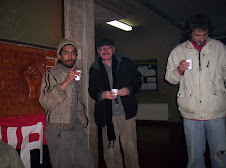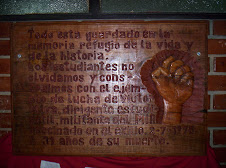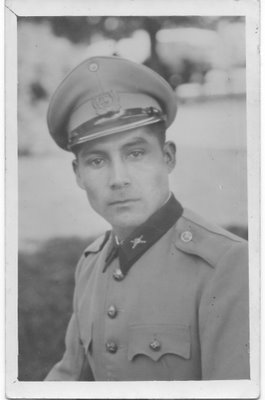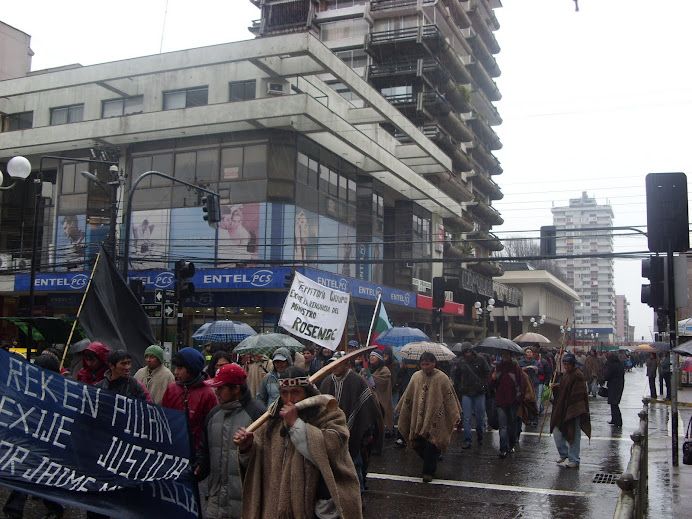¡Ex soldados chilenos están listos para contar sus secretos!
por Eva Vergara y Michael Warren (Common Dreams.org)
lunes, 02 de noviembre de 2009
ANTIGUOS SOLDADOS LISTOS PARA CONTAR SECRETOS DEL GOLPE

SANTIAGO, Chile.
Cientos de ex conscriptos militares le han hecho una provocativa oferta al gobierno chileno: ellos revelarían detalles de los crímenes cometidos por la dictadura del general Pinochet, pero sólo si se les garantiza su seguridad.
Los conscriptos temen que si revelan dónde se encuentran enterrados los cuerpos, enfrentarán procesos por parte de las cortes, o represalias de parte de los superiores quienes les ordenaron, hace décadas, torturar y matar prisioneros políticos.
La información que una vez ellos prometieron llevarse a la tumba, se ha transformado, tanto en en una pesada carga psicológica, como en una "ficha de negociación". Al ofrecer sus confesiones, los ex conscriptos esperan mejorar sus posibilidades de asegurarse beneficios, que irían desde pensiones hasta tratamientos psicológicos.
"Fuimos ejecutores y testigos de muchas brutalidades y ahora estamos dispuestos a hablar de ellas para nuestra propia redención personal", dijo el ex soldado Fernando Mellado, quien está organizando una reunión dominical de ex conscriptos frente al palacio presidencial.
"De manera que si hay alguna oportunidad en la que podamos testificar, quizás si anónimamente, entonces estaremos felices de hacerlo".
Mellado lidera el capítulo santiaguino de la organización "Ex Soldados de 1973", y ha estado trabajando con grupos similares a lo largo de Chile, para llegar a una fórmula de cómo y dónde entregar la información. El está llamando a los conscriptos a contar lo que saben.
Cree Mellado que de los 8.000 adolescentes reclutados sólo en Santiago, en el tumultuoso año en que Pinochet derrocó el gobierno de Salvador Allende y aseguró su control del poder, entre el 20 y el 30% estarían dispuestos a hablar.
De acuerdo con un contéo oficial, durante la dictadura las fuerzas chilenas de seguridad mataron 3.186 personas, incluyendo 1.197 que fueron hechas desaparecer.
En cerca de las dos décadas de democracia transcurridas desde entonces, menos del 8% de los desaparecidos han sido encontrados, dijo Viviana Díaz, de la Organización de Familiares de Detenidos-Desaparecidos.
Cientos de restos encontrados, algunos de ellos sólo fragmentos óseos, aún no han sido identificados. Sólo aquellos que enterraron los cuerpos saben dónde se encuentran otras fosas comunes.
Por su parte, Viviana Díaz espera que los ex conscriptos comiencen a hablar, incluso si lo hacen fuera de las cortes. "Hay gente que se nos ha acercado y todo lo que les decimos es 'no importa que no revelen su identidad, sólo cuéntennos la ubicación de los cuerpos, y los detalles' ".
La ley chilena permite la defensa de "sólo cumplia órdenes" a los ex soldados que se someten a la clemencia de las cortes, que dan nombres y suministran información que pudiera ayudar a resolver algúnos de los miles de crímenes cometidos entre 1973 y 1990, bajo el poder de Pinochet.
Esta defensa, "existe teóricamente y se aplica en Chile, y los jueces puden incluso hacer testificar a personas en secreto", dijo el abogado Hiram Villagra, quien representa a las familias de los muertos y desaparecidos.
Pero la mayoría de los ex soldados le temen a las consecuencias, para ellos y sus familias. Algunos temen que los jueces que hicieron sus carreras bajo Pinochet, pudieran protejer a sus ex oficiales superiores.
En una extensa entrevista a la Associatesd Press, Fernando Mellado dijo que los ex conscriptos también son víctimas, obligados a hacer su servicio militar siendo menores de edad y forzados a comenter actos inombrables, o ser asesinados ellos mismos. Declaró que muchos de ellos le han contado de horribles crímenes que quisieran descargar de sus conciencias.
Un ex soldado confesó haberle disparado a una familia completa. Otro, que ahora es un alcohólico que duerme en las calles de Santiago, contó que fue obligado a ahogar a un niño de siete años en un barril con cemento líquido. Otros describen horribles escenas de toruras, y el lanzamiento de cuerpos desde helicópteros.
"Nuestra misión era hacer guardia afuera, y escuchar los gritos" dijo el ex conscripto José Paredes, quien, en una entrevista con la A.P. describió su servicio militar en el centro de torturas de Tejas Verdes. "Ellos terminaron destrozando sus caras y quebrandoles sus dientes".
"Hay cosas que siempre dije que me llevaría a la tumba", cuenta Paredes, con su rostro bañado en lágrimas, mientras nombra a una media docena de oficiales, quienes, dice, le dieron las órdenes.
"Nunca le conté esto a nadie".
El gobierno chileno ha hecho varios esfuerzos de alto perfíl para resolver los crímenes de esta guerra sucia, pero Mellado replica que los ex conscriptos que han querido testificar no han sido aceptados: el Ministerio de Defensa los envió a las cortes civíles, mientras que las autoridades civíles los consideran como militares.
Hiram Villagra concuerda con que ya ha pasado tiempo suficiente para que los soldado que quieren redimirse lo hagan, y envía un mensaje de apoyo a Mellado por sus esfuerzos para reunir testimonios.
"Claramente no hay deseo de nuestra parte de que estos soldado carguen el peso de las culpas de los oficiales, que fueron los que tomaron las decisiones", dijo Villagra. Una revisión de la A.P. encontró 769 oficiales de seguridad, tanto en servicio activo como retirados, en su mayoría del Ejército, que han sido juzgado por asesinatos y otras violaciones de los derechos humanos. Casi todos ellos niegan haber cometido crímenes. Sólo 276 han sido sentenciados.
Gran parte de la evidencia provino de prisioneros. El testimonio de ex soldados podría hacer mucho por resolver estos casos.
2009 Associated Press.Traducción para piensaChile de H.H.B.
Versión original en inglés:
Published on Sunday, November 1, 2009 by the Associated PressChile: Old Soldiers Ready to
Tell Secrets of Coup
by Eva Vergara and Michael Warren
SANTIAGO, Chile
— Hundreds of former military draftees are making a provocative offer to Chile's government: They will reveal details of crimes committed by Gen. Augusto Pinochet's dictatorship — but only if their safety is guaranteed.
[In this Sept. 11, 2008 file photo, relatives of dissidents who disappeared under the dictatorship of Gen. Augusto Pinochet hold their pictures during the 35th anniversary of the military coup led by Pinochet in Santiago. (AP Photo/Roberto Candia, File)]In this Sept. 11, 2008 file photo, relatives of dissidents who disappeared under the dictatorship of Gen. Augusto Pinochet hold their pictures during the 35th anniversary of the military coup led by Pinochet in Santiago. (AP Photo/Roberto Candia, File)The draftees fear that if they reveal where the bodies are buried, they will face prosecution by the courts or retaliation by the superiors who ordered them decades ago to torture and kill political prisoners.
The information they once promised to carry to their graves has become both a heavy psychological burden and a bargaining chip. By offering confessions, the former draftees hope to improve their chances of securing benefits from pensions to psychological treatment.
"We were executors and witnesses of many brutalities and now we're willing to talk about them for our own personal redemption," said former soldier Fernando Mellado, who is organizing a Sunday gathering of draftees outside Chile's presidential palace.
"So if there is any opportunity in which we can testify, maybe anonymously, then we'd be happy to oblige."
Mellado leads the Santiago chapter of the Former Soldiers of 1973 and has been working with similar groups across Chile to figure out whether and how to turn over the information. He is calling on draftees to tell what they know.
Of the 8,000 people drafted as teenagers from Santiago alone in the tumultuous year when Pinochet overthrew Salvador Allende's government and cemented his hold on power, Mellado believes "between 20 and 30 percent are willing to talk."
Chilean security forces killed 3,186 people during the dictatorship, including 1,197 who were made to disappear, according to an official count.
In nearly two decades of democracy since then, less than 8 percent of the disappeared have been found, said Viviana Diaz of the Assembly of Family Members of the Disappeared Detainees.
Hundreds of recovered remains, some just bone fragments, have yet to be identified. Only those who buried the bodies know where other common graves lie.
Diaz, for one, hopes the former draftees start talking, even if they do so outside the courts. "People have come to us and all we tell them is, 'It doesn't matter that you don't reveal your identity, just tell us the location, details.'"
Chilean law allows for a "just following orders" defense for former soldiers who submit to the mercy of the courts, naming names and providing information that could help resolve some of the thousands of crimes committed under Pinochet's 1973-1990 rule.
The defense "theoretically applies and exists" in Chile, and judges can even have people testify in secret, said attorney Hiram Villagra, who represents families of the dead and disappeared.
But most former soldiers fear the consequences for themselves and their families. Some worry that judges who rose through the ranks under Pinochet might protect their former superior officers instead.
In a lengthy interview with The Associated Press, Mellado said the former draftees also are victims — forced into service as minors and made to do unspeakable things or be killed themselves. He said many have told him of horrifying crimes they want to get off their chests.
One confessed to shooting an entire family. Another — now an alcoholic who sleeps in the street in Santiago — said he was forced to drown a 7-year-old boy in a barrel of hardening plaster. Others describe harrowing torture sessions, and loading bodies onto helicopters to be dumped at sea.
"Our mission was to stand guard outside, and listen to their screams," said former draftee Jose Paredes, who described his service at the Tejas Verdes torture center in an AP interview. "They would end up destroyed, torn apart, their teeth and faces broken."
"There are things that I've always said I will take to the grave," Paredes said, his grizzled face running with tears as he named a half-dozen officers who he said gave the orders. "I've never told this to anyone."
The Chilean government has made several high-profile efforts to resolve dirty war crimes, but Mellado said former draftees who wanted to testify were turned away: the Defense Ministry sent them to civilian courts, while civil authorities considered them to be military.
Villagra agrees the time is overdue for the soldiers to seek redemption — and sent a message of support for Mellado's efforts to gather their testimony.
"Clearly there is no desire from our part for these soldiers to carry the burden of guilt of the officers, who were the ones who made the decisions," Villagra said.
An AP review found 769 current and former security officers, most of them military, have been prosecuted for murders and other human rights violations. Almost all deny committing crimes. Only 276 have been sentenced.
Much of the evidence came from former prisoners. Testimony from former soldiers could do much to resolve these cases.© 2009 Associated Press
- Agradecemos al señor Jorge Silva por el envío de este artículo
*
*
*
*

































































































.jpg)

.jpg)



























































































No hay comentarios:
Publicar un comentario